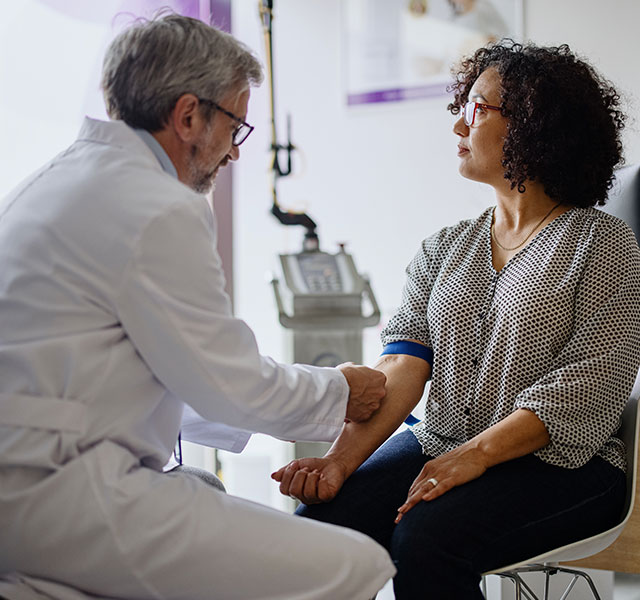Cholesterol is a type of fat (lipid) that is naturally produced by the body and consumed through what you eat. However, too much of this fatty substance in your blood is what leads to plaque buildups in your arteries. These blockages put you at a greater risk for heart attack, stroke or the need for surgery.
Cori Russell, M.D., director of the Lipid Clinic at Henry Ford Health, explains that annual cholesterol panels (a blood test that measures different fats in your blood) can help you and your physician have better insight into your cholesterol levels. From there, you can work together to make any modifications necessary to keep your levels in check.
“It is important to note that there are many different references out there that advise on when to seek care for your specific cholesterol levels,” says Dr. Russell. “I like to be conservative with my recommendations just to make sure patients are talking with their doctor about their levels and exploring options for treatment.”
Understanding What Makes Up Your Cholesterol Panel
Cholesterols panels are typically done every year starting around age 18-20. In cases where a patient has genetically high cholesterol, screenings may start as early as 2 years old. If you are actively working with your doctor to manage your cholesterol levels with medication or lifestyle changes, you may also be asked to redo your cholesterol panel every three months to monitor your efforts.
“Cholesterol panels show many different numbers and often, people think they should be paying attention to their total cholesterol level,” says Dr. Russell. “The reality is your low-density lipoprotein (LDL) levels are the most helpful in predicting your risk.”
Here, Dr. Russell shares some guidelines for understanding what these levels indicate:
LDL Cholesterol
Your LDL cholesterol is the cholesterol that contributes to plaque buildups in the body. Having low LDL levels is essential for reducing your risk of heart complications, or if you’ve already had a heart attack or stroke, to prevent future events from happening.
- If you are generally healthy, but have an LDL number of over 100, talk with your doctor to begin exploring ways that you can lower these levels through lifestyle changes or medication.
- If you have a reading of over 190, this is likely due to high cholesterol that is genetic, and you should consult with a lipid specialist right away.
- If you already have risk factors for a heart attack or stroke (obesity, smoking, high blood pressure), anything over 55 might be cause for concern.
So how low is low? According to Dr. Russell, the American Heart Association (AHA) has actually removed the floor for how low your LDL levels can be. But getting these really low numbers isn’t something you can do without help.
“If you aren’t taking medication for your cholesterol, it really isn’t possible to get your numbers lower than 50,” says Dr. Russell. “Additionally, for really high-risk patients, we might try to keep their LDL levels well below 50 to lower the risk of heart attack and stroke,” Dr. Russell says.
HDL Cholesterol
High-density lipoproteins (HDLs) are needed by the body to help manage LDLs. As a result, HDLs are often known as the good kind of cholesterol. According to Dr. Russell, these cholesterol levels can be raised or lowered depending on your lifestyle choices. “Eating a healthy diet and exercising regularly contributes to higher levels of HDLs,” says Dr. Russell. “We might want to explore options for improving these levels if they dip below 40 on your panel results.”
Triglycerides
Triglycerides are another type of fat found in your blood that is measured on your cholesterol panel. “While triglycerides aren’t as closely related to your risk of heart disease, we will still want to pay attention to the levels,” says Dr. Russell.
- If your results are anything above 250, talk to a cardiologist.
- Be aware of extremely high levels of triglycerides. Levels around 500 can cause pancreatitis and need to be managed right away.
Dr. Russell also notes that triglycerides are impacted by your diet more dramatically than other cholesterol levels. If triglycerides are your main cholesterol issue, she recommended that you have your cholesterol screening done in the morning after fasting overnight to provide a more accurate reading.
Lipoprotein (a)
You are usually only screened for lipoprotein (a) once in your lifetime. But this cholesterol protein is one that doctors have begun paying attention to more. It has been shown to have potentially worse effects on the body than high levels of LDLs do. Like LDLs, having high levels of this protein can increase your risk of heart attack or stroke. The difference though, is that lipoprotein (a) is genetic.
“Right now, there is a lot of research going into ways to lower your level of lipoprotein (a)," says Dr. Russell. “A reading of over 15 is something you need to talk to your doctor about. From there, even if you have acceptable levels of LDL, you may still need to take medication to lower your LDLs even more to offset this other type of cholesterol.”
How To Change Your Cholesterol Levels For Better Health

Changing your cholesterol levels can be a tricky business. For example, diet and exercise are the best ways to see improvement in your HDL levels but won’t have the same effects on your LDL levels.
“Unfortunately, LDL levels just aren’t as sensitive to diet and exercise, but that doesn’t mean that those lifestyle changes won’t help,” stresses Dr. Russell. “Even if diet and exercise only lower your levels by 10-20%, you still need to maintain a healthy lifestyle to avoid other risk factors of heart attacks and stroke. At the end of the day, these changes benefit your overall health.”
Additionally, many patients may question whether or not they should be on cholesterol lowering medications. Dr. Russell says that it depends on where your levels are starting off at. “If someone has already had a heart attack, diet and exercise will help you, but your body will not be able to lower your cholesterol levels enough without medication,” she says.
You might also consider getting a coronary calcium scan. This scan provides a visual of developing blockages in and around the heart. Not only is this helpful for patients to better understand their risk, but it can help physicians make decisions in prescribing cholesterol medication.
Talk to your doctor about the results of your cholesterol panel before making any changes to your health. Your doctor will help you to understand what these numbers mean for you and how you can make modifications in your life.
Reviewed by Dr. Cori Russell, a lipid specialist and director of the Lipid Clinic at Henry Ford Health. She sees patients at Henry Ford Hospital in Detroit.



